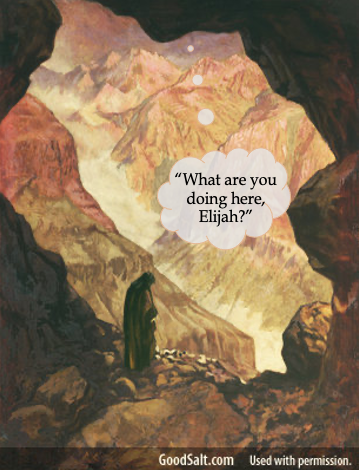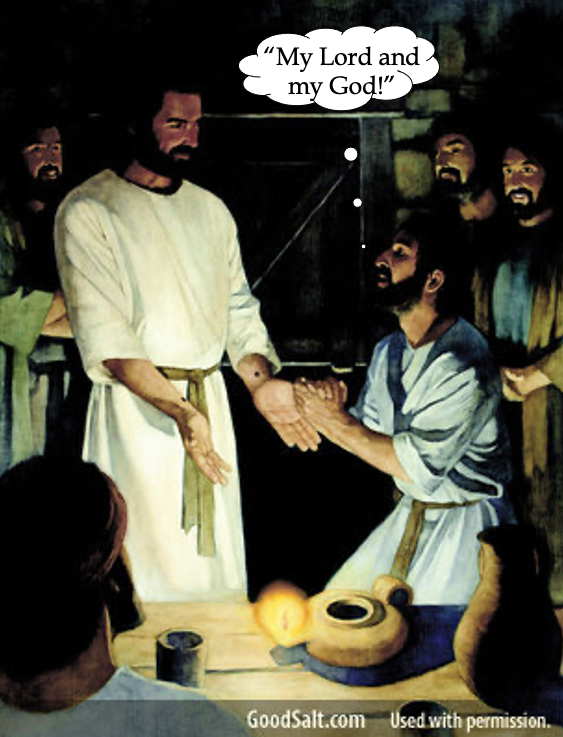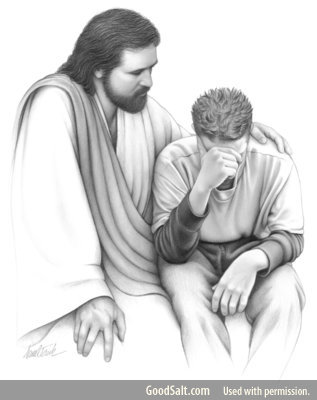“And Thomas answered and said to Him, ‘My Lord and my God!’ ” John 20:28
In John 20:24-29, we are learning how to overcome doubt. So far we have discovered we can overcome doubt when we…
– Restore our fellowship with other Christians (John 20:24).
– Readjust our unrealistic requirements for belief (John 20:25a).
– Redirect our wills toward believing (John 20:25b-27).
Today we learn that the fourth way to overcome our doubts is to RENEW OUR CONFESSION OF FAITH (John 20:28). After Jesus gave Thomas undeniable evidence that He was alive and invited him to believe (John 20:26-27), “Thomas answered and said to Him, ‘My Lord and my God!’ ” ( John 20:28). A personal encounter with the risen Lord Jesus caused Thomas’ doubts to vanish. He then makes one of the greatest confessions in all of the Bible. “My Lord and my God!”
When you hear the word “confession,” it may have a negative connotation to you. You might have this image of sitting in a booth in a church. It is there that you confess your sins to this guy you cannot see sitting on the other side of a partition. Or you may have an image of a windowless room in a police station somewhere with a bright light on you and you are being asked to confess a crime. I understand how these first two images can be unnerving. But the kind of confession we are talking about in this verse is a positive confession where we say the truth about someone or something. In this instance, we say the truth about God. 1
The apostle John uses Thomas’ confession to connect us back to the prologue where we read, “1 In the beginning was the Word, and the Word was with God, and the Word was God… 14 And the Word became flesh and dwelt among us, and we beheld His glory, the glory as of the only begotten of the Father, full of grace and truth… 16 And of His fullness we have all received, and grace for grace. 17 For the law was given through Moses, but grace and truth came through Jesus Christ. “ (John 1:1, 14, 16-17). At the beginning of his gospel, John wanted us to know that the Word, Jesus Christ, “was God.” He also tells us that Christ’s glory consists of being “full of grace and truth.” Jesus extends “grace for [after] grace” to His doubting disciple. Thomas knew that Jesus was God and also that Jesus was “full of grace” toward him despite his sinful unbelief. And now we see Thomas soaking up the riches of Christ’s grace as he worshiped his risen Lord and God.
This confession by Thomas is the high point of the gospel of John. “Here was a skeptical man, confronted by the evidence of Jesus’ resurrection. He announced that Jesus, the Man of Galilee, is God manifest in the flesh. Thus the truths in the first chapter were realized personally in this apostle (1:1, 14, 18). The Resurrection (a) demonstrated that what Jesus predicted about His being raised was true (Mark 8:31; 9:9, 31; 10:34; John 2:19), (b) proved that Jesus is the Son of God (Rom. 1:4) and was sent by God (‘vindicated by the Spirit,’ 1 Tim. 3:16), (c) testified to the success of His mission of salvation (Rom. 4:25), (d) entitled Jesus to a position of glory (1 Peter 1:11), and (e) proclaimed that Jesus is the ‘Lord’ (Acts 2:36).” 2
“John’s other witnesses to Jesus’ deity were John the Baptist (1:34), Nathanael (1:49), Jesus Himself (5:25; 10:36), Peter (6:69), the healed blind man (9:35), Martha (11:27), and John the Apostle (20:30-31).” 3
“The thing that God used to make a believer out of Thomas is the same thing God wants to use to make a believer out of any skeptic – the resurrection of Jesus Christ.” 4 Atheists have tried to disprove Christ’s resurrection only to be persuaded of its truth. People of other faiths have tried to dismiss this most important event in history only to be converted to Christianity.
There are several things we learn from this confession. The impact of this confession is underscored when we look at each word contained therein. 5 The first word is “my.” This is a personal word. A word of ownership. It is saying that faith does not belong to someone else. It belongs to me. It is mine.
The next word is “Lord” 6 which refers to one who is in a position of authority. It can mean “Master” and is a common designation for God. 7 When Thomas says, “my Lord,” he is declaring that Jesus is his Lord God. When I say Jesus is “my Lord,” I am saying that He is the One I look to for advice, direction, and guidance. He is my Boss and my Manager.
The third word in this confession is “and.” It is such an easy word to skip over. But in this confession it reminds us that one cannot contain the Person of Jesus Christ in one word. Jesus is “my Lord,” but He is so much more than that, isn’t He? He is not only my Lord, but He is also my Creator (John 1:3), my Master (Luke 6:46), my Friend (John 15:14-15), my Savior (Titus 2:13), my great High Priest (Hebrews 4:14-15), and my King (I Timothy 6:14-16). He is so many more things. It is amazing that this former skeptic now recognizes the greatness of Jesus Christ.
Then Thomas uses the word “my” again when he says, “my Lord and my…” That tells us how incredibly personal his confession of faith in Jesus Christ is. It also reminds us how personal our confession of faith in Jesus needs to be. Yes, we gather together and sing together as the family of God. And yes, we need to draw from one another’s faith. But no one else can have faith for you or for me. No one else can trust in Jesus Christ for you or for me. It has to be your decision and my decision.
The final word in this confession is the most powerful word – “God.” Thomas looked at Jesus and says to Him, “my Lord and my God.” The Man Thomas has been walking with for over three years is so much more than a mere man. Thomas sees the truth about Jesus. Perhaps he sees it better than the other disciples. He says, “Jesus, You are not just a Messiah sent from God.” In some miraculous way that Thomas may not have totally understood, he said, “Jesus, You are God. You are the Creator. You are the One Who made me. You are the One Who is in charge of everything. You are the One Who is worthy of all my love, my devotion, and my worship. My Lord and my God. The Director of my life Whose Being cannot be contained in mere words. You are the One I look to for my very existence and purpose.”
Throughout the Bible, we observe that worship takes place as people encounter Who God is and at that same moment, they see who they are in His holy presence. 8 For example, when the prophet Isaiah saw God on His throne encompassed by angels proclaiming, “Holy, holy, holy is the Lord of hosts; the whole earth is full of His glory!” (Isaiah 6:3), Isaiah immediately cries out, “Woe is me, for I am undone! Because I am a man of unclean lips, and I dwell in the midst of a people of unclean lips; for my eyes have seen the King, the Lord of hosts.” (Isaiah 6:5). For Isaiah, that was a moment of overpowering worship!
When Peter had fished all night without catching any fish and Jesus, Who was in the boat later that same day, provided a miraculous boat-sinking, net-breaking catch of fish, Peter’s immediate response was to “fall down at Jesus’ knees, saying, ‘Depart from me, for I am a sinful man, O Lord,’ ” (Luke 5:8). Peter got a glimpse of Who Jesus was and spontaneously worshiped his Lord. Later on when Christ calmed the wind and the waves that threatened to sink their boat, His disciples were afraid and marveled. They said to one another, “Who can this be? For He commands even the winds and water, and they obey Him!” (Luke 8:25). They witnessed the mighty power of Jesus which exposed their own weaknesses, and then they worshiped Christ.
Thomas has the same experience when he encounters the risen Lord Jesus, Who materialized behind locked doors (John 20:26). Thomas hears Christ quote what he had said to the other disciples when Jesus was not there with them (John 20:25, 27). Immediately Thomas realizes that Jesus is not only risen, but He is also all-knowing! Thomas also recognizes his own sinful unbelief in doubting the resurrection. He spontaneously cries out, “My Lord and my God!” He was now believing in the risen Lord Jesus and was worshiping Him.
Some skeptics, such as the Jehovah’s Witnesses, claim that Thomas was expressing shock like the common American expression, “O my God!” But that would violate the command not to take the name of the Lord our God in vain (Exodus 20:6), and Jesus would have certainly corrected Thomas. And, like Peter when Cornelius fell at his feet and worshiped him, Jesus would have rebuked Thomas and said, “Stand up; I myself am also a man.” (Acts 10:25-26). But instead of correcting Thomas, Jesus commends his confession and worship of Him as an example of the faith that all people are to have who have not seen Christ personally (John 20:29). All of us are to believe in and worship Jesus personally as “my Lord and my God.”
In the gospel of John, God wants us to believe specifically “that Jesus is the Christ, the Son of God” (John 20:31). He wants us to believe that the risen Jesus is “my Lord and my God.” If Jesus is anything less than the eternal Lord and God of the Bible, it would be a terrible sin to worship Him. But if He truly is the eternal Lord and God (and He is), it would be a terrible sin not to worship Him.
What will be your response? Can you say that Jesus is your Lord and your God? If not, what is keeping you from saying that? Your bitterness? Your disappointments? Your family? Your guilt or shame? Your ignorance? Your past? Your pride? Your presuppositions? Your religion? Your unwillingness to move toward believing?
Thomas experienced the fullness of Jesus’ grace when He encountered Jesus behind locked doors. Have you experienced God’s abundant grace in Jesus Christ? He sends His Holy Spirit to convict us of our sin so we may see our need to believe in Jesus (John 16:7-9). He convicts us of our need for God’s righteousness through faith in Jesus instead of our own righteousness (John 16:10; Romans 4:5). He convinces us that we rightly deserve the same judgment that will be given to Satan in the lake of fire (John 16:11; cf. Revelation 20:10, 15).
But then God’s Spirit opens our eyes to the good news that Christ Jesus came into this world to save sinners, including you and me (1 Timothy 1:15). And we realize that God does not save sinners after they have worked hard to clean up their lives and earn it. No, God saves sinners by His grace through faith alone in Jesus alone. A former persecutor of Christianity writes, “However, for this reason I obtained mercy, that in me first Jesus Christ might show all longsuffering, as a pattern to those who are going to believe on Him for everlasting life.” (I Timothy 1:16). Eternal life is a free gift that we receive by believing in Jesus. No amount of our good works can earn this gift. It has already been paid for through the death and resurrection of Christ (John 19:30; I Corinthians 15:3-6).
But then after believing in Jesus, we still have doubts, just like Thomas did when he doubted the resurrection. What are we to do then? Like Thomas, we are to be honest with the Lord about our doubts. When we do this, we make a personal connection with Jesus so He can answer our doubts.
What doubts are you struggling with right now? Some of us may have doubts about God’s direction in our lives. Perhaps we doubt God’s ability to provide for our needs. If you have doubts, don’t hide them. Talk to the Lord Jesus like Thomas did. When you start to make it personal between you and Him, He can start to answer those doubts. That is the beauty of what Jesus can do.
Thomas teaches us some important principles about confessing our faith in the middle of our doubts. 9
1. Confessions are important. Without them faith can lose its vitality. If I am not telling God what He means in my life then my faith will be less alive. If I am just listening to others talk about God or someone else sing to God, then my faith is going to become dead or useless. But when I confess my faith together with other believers and personally to God, my faith will grow in vitality.
2. Confessions are personal. Thomas said, “my Lord and my God.” The Bible’s idea of confession is a personal declaration of belief. You cannot live on borrowed faith. It doesn’t matter if it is your parent’s faith or your friend’s faith. It must be personal for you to overcome your doubts.
3. Confessions are visible. They are heard by others. We are to confess our faith with our mouths before other people. The Bible tells us, “9That if you confess with your mouth the Lord Jesus and believe in your heart that God has raised Him from the dead, you will be saved. 10 For with the heart one believes unto righteousness, and with the mouth confession is made unto salvation.” (Romans 10:9-10). The “salvation” spoken of in these verses includes both salvation from hell and salvation from the power of sin after we become Christians. For this kind of “salvation” or deliverance to take place in our lives, you must first “believe in your heart that God has raised Him from the dead” to receive God’s “righteousness.” After we are justified and reconciled to God through faith alone in Christ’s death (Romans 3:21-5:9a), we can then be saved from God’s present-wrath (Romans 1:16-32) or the power of sin through faith in Christ’s life (Romans 5:9b – 8:39).
This second type of salvation requires confessing “with your mouth” and believing “with your heart.” God’s people could not ask for assistance (with the “mouth”) from Christ to obey God’s commands without first believing (with the “heart”) in Christ resulting in God’s righteousness. Verse 10 explains (“For”) this sequence: “For with the heart one believes unto righteousness, and with the mouth confession is made unto salvation.” We come to know Christ by believing in Him from the heart resulting in God’s righteousness (Romans 10:10a; cf. Romans 3:21 – 5:9a). We make Christ known to others by confessing Him with our mouths resulting both in salvation from God’s wrath on present-day sin (Romans 10:10b; cf. Romans 1:16-32; 5:9-10) and victory in our Christian lives (Romans 5:9-8:39; cf. Matthew 10:32; Luke 12:8). To believe in the heart resulting in God’s righteousness is justification. To confess with the mouth resulting in salvation is sanctification.
This sequence is confirmed by Romans 10:14-15a when the verbs in these verses are reversed – “sent …preach…hear…believe… call on Him.” We see that calling on the name of the Lord (confessing Christ) is done after believing in Christ and is therefore something Christians do after their conversion to obtain divine assistance in living the victorious Christian life (Romans 5:9-8:39; cf. Acts 9:21; I Corinthians 1:2).
These verses tell us the importance of making our confession of faith visible so other people can know about our faith. Obviously there are people who can’t speak but they can make their faith visible in other ways. The key is to be willing to share my faith with other people. This is what makes my faith real. One of the reasons we may have doubts about our own faith is because we are not telling other people about it. But once you start to let other people know about your faith in Jesus, you will find out what Thomas found out. Confessions of faith are vital to having a faith that is alive and growing.
Prayer: Lord Jesus, we must admit that there are times when we struggle with doubts. Although we may have fewer doubts now than we used to have, there are still things we are not sure of. Some of us may have doubts about a decision we need to make or uncertainty about Your constant love for us or even doubts about Your forgiveness. Like Thomas did two thousand years ago, we need to admit we are doubters and talk to You about it so You can answer our doubts. Because of Your radical love for us, You can transform out doubt into faith if we will simply be honest with You. Lord, we cannot figure it all out on our own. So we come to You confessing our need for You. Help us to hear from You now, knowing that You want to be personally involved in the doubts we are facing. You have a personal answer for each of us. Please fill us with Your loving answers to our doubts. Grant us the courage to make our faith known to others so that our faith is alive and growing. In Your mighty name we pray. Amen.
ENDNOTES:
1. Adapted from Tom Holladay’s August 28, 1996 sermon entitled, “How to Have Faith.”
2. Edwin A. Blum, The Bible Knowledge Commentary Gospels, Editors John F. Walvoord and Roy B. Zuck, (David C Cook, 2018 Kindle Edition), pg. 700.
3. Tom Constable, Notes on John, 2017 Kindle Edition, pg. 383.
4. The Evangelism Study Bible (Grand Rapids: Kregel Publications, copyright 2014 EvanTell, Inc.), pg. 1193.
5. Adapted from Holladay’s sermon entitled, “How to Have Faith.”
6. In the Greek it is Kurios.
7. Walter Bauer, A Greek-English Lexicon of the New Testament and Other Early Christian Literature: Third Edition (BDAG) revised and edited by Frederick William Danker (Chicago: University of Chicago Press, 2000 Kindle Edition), pg. 577-578.
8. Adapted from Steven J. Cole’s sermon on September 6, 2015 entitled, “Lesson 103: The Aim of the Gospel (John 20:24-31)” at www.bible.org .
9. Adapted from Holladay’s sermon entitled, “How to Have Faith.”







